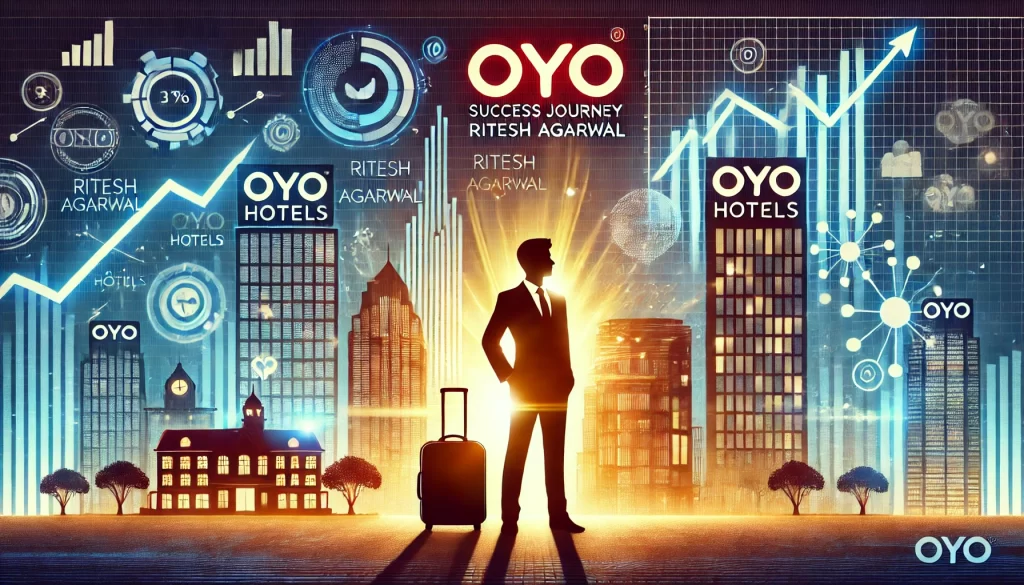Introduction
The hospitality industry has undergone a significant transformation in the past decade, and one name that stands out in this revolution is OYO Hotels & Homes. Founded by Ritesh Agarwal, OYO started as a small startup in India and grew into one of the world’s largest hotel chains. The journey of Ritesh Agarwal is an inspiring tale of vision, perseverance, and innovation. This blog explores the success story of OYO, the challenges it faced, and the key factors behind its growth.
The Early Life of Ritesh Agarwal
Ritesh Agarwal was born in 1993 in Bissam Cuttack, Odisha, India. From an early age, he had a keen interest in technology and business. At just 13 years old, he started learning coding and exploring business ideas. Unlike most students, he was more inclined toward entrepreneurship than academics.
In 2011, Ritesh moved to Delhi for college, but his passion for startups led him to drop out of the Indian School of Business and Finance. He was selected for the Thiel Fellowship (a prestigious fellowship by PayPal co-founder Peter Thiel) in 2013, which provided him with $100,000 in funding to work on his business idea.
The Birth of OYO Rooms

Ritesh initially launched a venture called Oravel Stays in 2012, inspired by Airbnb. The idea was to offer affordable and standardized accommodation for budget travelers in India. However, he quickly realized that the Indian hospitality sector had a major gap in budget hotel quality and service.
In 2013, Oravel Stays was rebranded as OYO (On Your Own) Rooms, with a new mission—to provide standardized, affordable, and technology-driven accommodations across India. Unlike Airbnb, which focused on home rentals, OYO partnered with small hotels to transform them into budget-friendly, well-managed properties.
The Growth and Expansion of OYO
OYO started with just one hotel in Gurgaon, India. However, its unique model of leasing and franchising hotels quickly gained traction. Within a few years, OYO expanded across multiple cities in India.
Key Growth Milestones:
- 2015: Raised $25 million in funding from investors like SoftBank.
- 2016: Expanded to Southeast Asia, starting with Malaysia.
- 2017-2018: Entered China, UAE, UK, and Europe, becoming a global brand.
- 2019: Became the third-largest hotel chain in the world, managing over 1 million rooms worldwide.
- 2020: Faced setbacks due to COVID-19 but adapted with innovative solutions like long-term rentals and sanitized stays.
- 2021-2023: Bounced back, focusing on profitability, technology, and customer service.
The Business Model of OYO
OYO operates on an asset-light model, meaning it doesn’t own hotels but partners with independent hotel owners. The company helps these hotels with branding, technology, operational support, and customer acquisition, ensuring consistent quality and experience for travelers.
OYO earns revenue through a commission-based model and franchise fees, making it an attractive solution for hotel owners looking to boost occupancy and revenue.
Challenges Faced by OYO

While OYO saw tremendous success, it also encountered multiple challenges:
- Quality Control Issues: Managing a vast number of properties while maintaining consistent service was a challenge.
- Rapid Expansion Risks: Aggressive expansion in multiple countries led to financial and operational strain.
- Regulatory and Legal Issues: OYO faced legal disputes and government regulations in different countries.
- COVID-19 Pandemic: The hospitality industry took a massive hit in 2020, forcing OYO to restructure and rethink its strategy.
Lessons from Ritesh Agarwal’s Journey
- Start Early and Take Risks: Ritesh started his entrepreneurial journey at a young age, proving that age is not a barrier to success.
- Adaptability is Key: Pivoting from Oravel Stays to OYO Rooms was a crucial move that led to success.
- Focus on Solving Real Problems: Identifying and addressing the lack of standardized budget hotels made OYO a game-changer.
- Technology-Driven Approach: Leveraging AI, machine learning, and data analytics helped OYO optimize hotel management and customer experience.
- Never Give Up: Despite numerous challenges, Ritesh Agarwal continued to innovate and rebuild OYO into a strong brand.
Conclusion
The journey of Ritesh Agarwal and OYO is an inspiring example of how vision, determination, and innovation can disrupt an industry. From a small startup in India to a global hospitality giant, OYO’s story proves that with the right mindset and strategy, anything is possible. Despite challenges, OYO continues to evolve, setting new benchmarks in the hospitality sector.
For aspiring entrepreneurs, Ritesh’s journey is a lesson in resilience, adaptability, and the power of thinking big.


